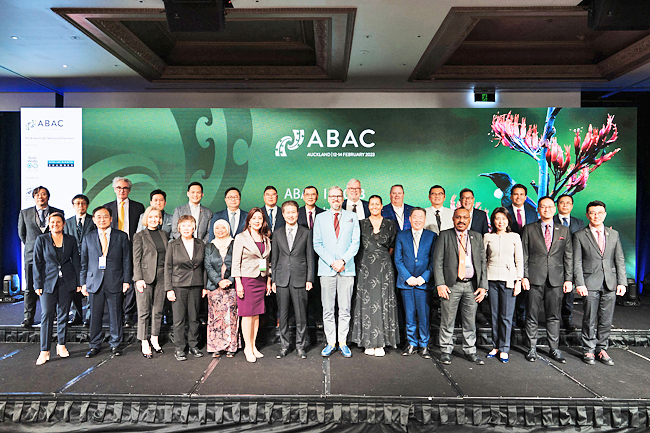Danial Norjidi
Members of the APEC Business Advisory Council (ABAC) recently met in Auckland, New Zealand for the first ABAC meeting of the year to develop a work plan that calls on policymakers to leverage trade and economic policies to address the region’s sustainability and economic inclusion challenges.
Reflecting on the meeting, ABAC Brunei Chair and Executive Director of LVK Group of Companies Nik Hafimi binti Abdul Haadii and ABAC Brunei member and Chief Executive Officer of Imagine Sdn Bhd (Imagine) Suzannawati binti Haji Suharju each shared comments.
Nik Hafimi said, “ABAC 1 kicked off in Auckland with climate change truly manifesting itself with the presence of Cyclone Gabrielle affecting Aotearoa New Zealand. ABAC colleagues in attendance stayed through to the course of our ABAC 2023 year of ‘Equity. Sustainability.
Opportunity.’ also with the presence of APEC senior officials engaging in a dialogue with ABAC members.
“ABAC Brunei members will be highly engaged in work surrounding Skills Mapping and ESG Framework with expected recommendations to form the work pathways this year.”
“ABAC members also were determined to communicate concise unified themes and discussions with a great leaning as well on advocacy for the Kuala Lumpur Declaration; Aotearoa Plan of Action and Bangkok Goals being clear guiding principles for ABAC 2023 work plans.”

In addition, Suzannawati said, “The first meeting for ABAC 2023 kicked off with members aligning on work plans with the theme of ‘Equity. Sustainability. Opportunity.’ The underlying success of ABAC is attributed to bringing shared learnings and views to tackle together common challenges for our community.
“With that, ABAC Brunei will spearhead an initiative in collaboration with ABAC Chile on Digital Skills Mapping for Underserved Women Entrepreneurs. It is our hope that we can equip women entrepreneurs to adapt to the use of e-commerce to develop their use of digital platforms and to support them in creating a sustainable business.
“We will initiate this pilot project and hope to engage the local community and interested stakeholders over the coming months. We stand true to being inclusive and sustainable and hope to contribute to our local community.”
Meanwhile, ABAC 2023 Chair Dominic Ng noted, “APEC members need to undertake massive decarbonisation of their economies while ensuring that disadvantaged parts of our communities are not left behind. Cross-border trade and investment and technological innovations can turbo-charge this critical work. The private sector is well-positioned to contribute to these efforts – but above all APEC member economies must make this a priority in designing their economic policies.”
According to a press statement, ABAC will commission reports and develop recommendations to APEC leaders that identify ways forward-looking trade and investment policies can be leveraged to tackle climate change, living standards, and digital transformation, among other challenges.
ABAC’s work plan will build on initiatives launched in 2022, including an agenda to progress towards a free trade area of the Asia-Pacific by focussing on early harvest achievements in the areas of digitalisation, inclusion, sustainability, and trade.
The statement further noted that ABAC will also explore ways it can contribute to the achievement of the Bangkok Goals on Bio-Circular- Green Economy, an initiative endorsed by APEC leaders last November, including through initiatives based on the ABAC Climate Leadership Principles for Business.
Work will also continue on cutting-edge digital issues, such as building trust and supporting the development of digital skills and trade flows to create opportunities for all.
It was shared that ABAC members conveyed elements of the 2023 work plan directly to policymakers in their annual dialogue with senior officials from trade and foreign affairs ministries in APEC economies.
“APEC provides a unique platform to bring business and government together to tackle the challenges and transitions facing our communities in a collaborative and cohesive manner. We were delighted to have the opportunity to engage in a frank dialogue with officials from around the region during our meeting in Auckland,” said Ng.
New Zealand Prime Minister the Chris Hipkins opened the ABAC meeting, stressing as he did the value of close partnerships with business to tackle shared challenges.
New Zealand’s Foreign Minister Nanaia Mahuta, and Minister for Trade and Export Growth Damien O’Connor also engaged with council members during the three-day meeting.
In addition, ABAC delegates had the opportunity to dialogue with innovative New Zealand businesses, including food production technology incubator The Food Bowl, sustainable meat producer Silver Fern Farms, and AI firm Soul Machines.


